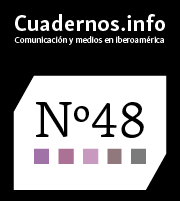Uso intensivo de herramientas y recursos de profesionalización política en campañas presidenciales: el caso de Colombia 2018
DOI:
https://doi.org/10.7764/cdi.48.27921Palabras clave:
Campañas presidenciales, profesionalización de las campañas, Índice de profesionalización, ColombiaResumen
Las campañas presidenciales en Colombia cada vez son más sofisticadas y profesionalizadas. Candidatos y partidos contratan expertos en distintas áreas (marketing político, imagen, redes sociales y producción audiovisual), hacen uso intensivo de nuevas tecnologías y medios de comunicación, personalizan la campaña en el candidato y realizan sondeos de opinión o encuestas de percepción ciudadana. Considerando los avances en la profesionalización, los objetivos de este trabajo son, primero, medir el nivel de profesionalización de las campañas de los tres principales candidatos presidenciales de Colombia en 2018 (Ivan Duque, Gustavo Petro y Sergio Fajardo), y, segundo, identificar las áreas de mayor desarrollo de técnicas e innovación que presentaron los diferentes grupos de dichas campañas. Para medir el nivel de profesionalización construimos un índice que permite hacer comparaciones tanto al interior de las campañas, como al exterior de las mismas.
Descargas
Citas
FAJARDO S. 2017. “El poder de la decencia. Ideas sensatas para un país en busca de confianza”. Editorial Ariel. Bogotá Colombia.
FARREL, D. (1996). Campaign strategies and tactics. Comparing Democracies: Elections and Voting in Global Perspective, pp. 160 - 183.
GIBSON, R. & Römmele, A. (2009). Measuring the professionalization of political campaigning. Party Politics, 15(3), 265-293.
HOLTZ-BACHA, C. (2002). Campañas electorales en Alemania. En F. Priess (Ed.), Relación entre política y medios. Propuestas alemanas en una perspectiva comparada (pp. 207–229). Buenos Aires, Argentina: Temas Grupo Editorial.
OREJUELA, S. (2006). Proceso de Globalización a la profesionalización. Revista de Comunicación, 5, 55 - 87.
RESTREPO-ECHAVARRÍA, N. J. (2015). La profesionalización de las campañas electorales: las elecciones presidenciales de Colombia 2010. Revista Española de Ciencia Política, 38, 85 - 114.
RESTREPO-ECHAVARRÍA, N. J., Rodríguez-Díaz, R., & Castromil, A. R. (2018). Proposal of an indicator to measure the professionalization of election campaigns: The case of Colombia. El profesional de la información, 27(2), 289-299.
ROCHA, F. (2007). La profesionalización de las campañas electorales en Brasil (1989 - 2006). Salamanca: Universidad de Salamanca.
SWANSON, David y MANCINI, Paolo. (1996). Politics, Media, and Modern Democracy: An International study of Innovations in Electoral Campaigning and their Consequences. United States
Descargas
Publicado
Cómo citar
Número
Sección
Licencia
Derechos de autor 2021 Cuadernos.info

Esta obra está bajo una licencia internacional Creative Commons Atribución-CompartirIgual 4.0.















